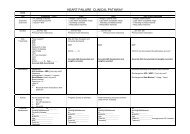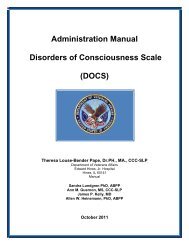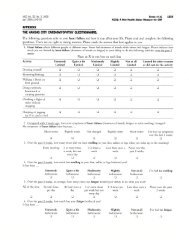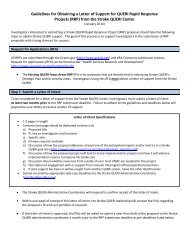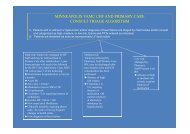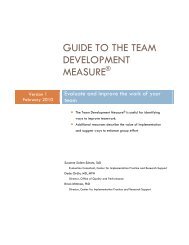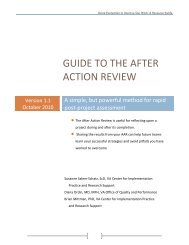The Veteran Supported Education Service Treatment Manual: VetSEd
The Veteran Supported Education Service Treatment Manual: VetSEd
The Veteran Supported Education Service Treatment Manual: VetSEd
You also want an ePaper? Increase the reach of your titles
YUMPU automatically turns print PDFs into web optimized ePapers that Google loves.
C. Variable <strong>Service</strong> Intensity, Continuous Assessment, and Time Unlimited<br />
Support<br />
Innovative practice in mental health and rehabilitation services include services that vary<br />
in intensity. This is in keeping with the ―up and down‖ nature of mental illness, and for<br />
<strong>Veteran</strong>s, the ―up and down‖ process of reintegration into civilian life. <strong>Veteran</strong> needs<br />
vary and support is needed over the long term, given that reintegration to civilian life and<br />
adjustment to mental health conditions is a process that occurs over years. Accordingly,<br />
<strong>VetSEd</strong> services should likewise increase and decrease with each <strong>Veteran</strong>‘s need at any<br />
given time. For example, a great deal of service may be needed during the initial step of<br />
choosing and enrolling in a college, but these needs may then wane during classes and<br />
wax during exam time.<br />
<strong>VetSEd</strong> also involves continuous assessment of <strong>Veteran</strong> need. Unlike job placement<br />
services, the work of the peer <strong>VetSEd</strong> provider does not end when the <strong>Veteran</strong> starts<br />
school. To prevent setbacks, on-going interaction is needed as the school career<br />
progresses. School systems have built-in mechanisms to regularly collect data about<br />
progress; these include tests scores and course grades. <strong>VetSEd</strong> assessment is not limited<br />
to academic performance. Other needs of the <strong>Veteran</strong> related to successful educational<br />
goal attainment are assessed continuously. Some possible needs might include further<br />
development of interpersonal skills (socializing with fellow students) and problem<br />
solving skills (steps for obtaining educational accommodations).<br />
Lastly, like other psychosocial services, <strong>VetSEd</strong> is best conceived as time unlimited, that<br />
is continuing despite occasions of disengagement and reengagement with an education<br />
program (Becker & Drake, 2003). <strong>The</strong>re should be an ―open door policy‖ allowing a<br />
<strong>Veteran</strong> to resume services easily following any service drop-out. Thus, peer <strong>VetSEd</strong><br />
providers deliver support that increases or decreases in intensity according to the<br />
<strong>Veteran</strong>s needs, and on the mutual understanding that reintegration into civilian life and<br />
adjustment to mental illness are part of an ongoing journey.<br />
D. Individualized and Flexible Supports<br />
<strong>VetSEd</strong> is designed to be primarily an individualized service. <strong>The</strong> educational plan or<br />
―roadmap‖ is <strong>Veteran</strong> specific. Goals and steps are tailored to the needs of each<br />
individual <strong>Veteran</strong>. Given that the goals are specific to each <strong>Veteran</strong> served, so too will<br />
be the design of the supports provided. Hence, this model uses a flexible ―whatever it<br />
takes‖ support strategy. Some <strong>Veteran</strong>s may need help learning to use the public<br />
transportation system; some may need help accessing benefits, while others may need a<br />
referral for family services.<br />
20 | P a g e



